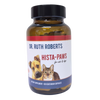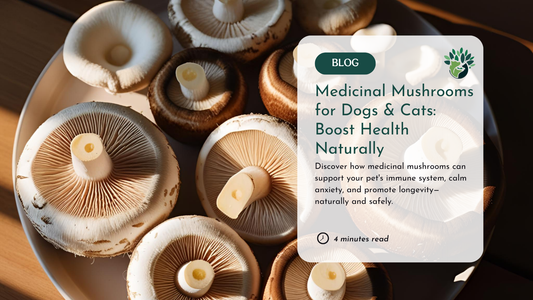In our HPHC live event on October 3rd, Dr. Ruth Roberts was joined by Melissa Sherman from Calming Creek. Melissa is one of our certified Holistic Pet Health Coaches, an animal communicator, and an energy healer. She is deeply passionate about helping pet parents improve their pets' well-being through communication, personalized care, and addressing root causes of physical, emotional, and spiritual issues.
In this post, we’ll explore how your pet's diet impacts their behavior and mood. Is your pet’s diet a trick or a treat? Let’s dive into how nutrition can shape their overall health and well-being.
The Connection Between Diet and Behavior
There’s no denying that food significantly impacts behavior—both in humans and pets. The gut-brain axis is the direct connection between the digestive system and the central nervous system. Whether your pet is eating a highly processed diet or one rich in whole foods, the quality of their nutrition directly affects their behavior.
Processed foods, especially those high in carbohydrates and artificial ingredients, can disrupt the gut microbiome. This, in turn, affects neurotransmitters essential for mood regulation, contributing to anxiety and behavioral issues such as aggression or restlessness. Correcting dog behavior or cat behavior can often begin with improving their diet.
How Food Affects Your Pet During Halloween and the Holidays
Halloween is a season of fun for us, but it can be stressful for our pets. The change in routine, kids in costumes, and the constant knocking on the door can trigger anxiety. Add in the fact that pets can pick up on their owner's energy, and you have a recipe for stress, especially if your pet's gut health is already compromised.
If your pet’s diet is heavily processed, they may struggle even more to cope with stress. Just like how sugar affects kids, a poor-quality diet in pets can feed anxiety and bad behavior.
Many commercial pet foods contain artificial dyes and additives that can exacerbate behavioral problems. While these dyes are meant to appeal to pet owners, pets don’t care about the appearance of their food. What they need is nutrient-dense, whole food that supports their gut and brain health.
How to Improve Your Pet’s Diet
Even if your pet is currently on a processed diet, it’s never too late to start making changes. You can begin by incorporating whole foods into their meals as toppers. Seasonal vegetables like pumpkin and winter squashes are great additions. These ingredients are rich in fiber and nutrients, promoting a healthy gut and helping to correct dog behavior or cat behavior that stems from poor diet. Simply steam or cook them, and use them as a topper for their current food.
Transitioning to a whole food diet doesn’t have to be overwhelming. Start small by adding 10-20% of real, fresh food to your pet’s bowl and build from there. You’ll begin to notice positive changes in their behavior, energy levels, and overall well-being.
The Behavioral Benefits of a Whole Food Diet
Have you noticed an improvement in your pet's behavior after switching to a whole food diet? It's not just a coincidence. When pets eat healthier, they feel better physically and emotionally. For instance, a dog that chews on furniture or a hyperactive cat might simply be reacting to nutrient deficiencies. As you correct their diet, you will also correct their behavior, leading to a calmer, more balanced pet that handles stress and their environment more effectively
Numerous studies have demonstrated the profound effect that nutrition has on pet behavior, with recent research offering insights into how diet can help correct behavioral issues in dogs and cats. One pivotal study, "Impact of Nutrition on Canine Behaviour: Current Status and Possible Mechanisms" by Bosch et al. (2007), provides a compelling case for how diet influences neurotransmitters and hormones, which are critical in regulating pet behavior.
The study highlights several key mechanisms by which nutrition, particularly amino acids, fatty acids, and dietary fiber, can affect behavior:

The research is clear—nutrient-rich, whole food diets are superior to processed diets in managing and improving behavioral issues in pets. A whole food diet provides the essential nutrients needed to support brain function, stabilize mood, and reduce anxiety or aggression, offering a natural way to help pets lead happier, healthier lives.
Food Sensitivity vs. Food Allergy
It’s important to differentiate between food sensitivities and allergies. True allergies are rare and usually result in an immediate and severe reaction. Sensitivities, on the other hand, often stem from an unhealthy gut and manifest as GI issues, skin problems, or behavioral changes. The good news? Food sensitivities can often be healed through diet. By removing the offending foods and healing the gut, you can slowly reintroduce those ingredients over time.
Seasonal Changes and Their Impact on Pets
As the season changes to fall and winter, you may notice a shift in your pet’s behavior. Just like humans, pets can experience seasonal depression due to reduced sunlight and lower levels of vitamin D. Incorporating fresh, seasonal produce like winter squash can help provide the nutrients they need to stay balanced during these months. Read more on our blog about seasonal eating to keep your pet healthy and happy year-round.
Another often overlooked nutrient source is mushrooms. Mushrooms like Lion’s Mane and Tremella are packed with vitamin D2 and can help boost immune function, gut health, and overall mood. Adding these to your pet's diet, whether through food or supplements like Real Mushrooms’ 5 Defenders, can offer powerful health benefits.
Final Thoughts
Improving your dog's and cat's diet with whole food can correct their behavior. Whether you're addressing dog food anxiety, cat food anxiety, or trying to correct dog behavior or cat behavior, nutrition is a critical foundation. Switching your pet to a whole food diet doesn't have to be stressful. Start with small steps, like adding fresh toppers to their kibble, and gradually increase the amount of real food in their meals. Not only will this improve their health, but you’ll likely notice improvements in their behavior and mood as well.
Remember, your pet’s diet is the foundation of their health, and by making simple changes, you can create a happier, healthier, and more balanced life for your furry friend.















